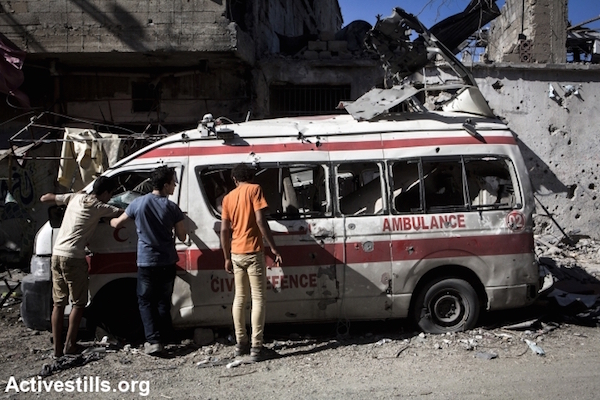The UN’s Commission of Inquiry report on the 2014 Gaza war has been able to achieve what the Goldstone report could not in 2009: a new gateway for confronting the EU to demand accountability for the devastation of the war.

Two weeks ago the UN Human Rights Council passed a resolution to adopt the report of the UN Commission of Inquiry (COI) on the 2014 Gaza Conflict, calling for the implementation of the report’s recommendations. In a move that some observers described as “unprecedented,” all eight EU member states on the Council – the U.K., France, Germany, the Netherlands, Ireland, Estonia, Latvia and Portugal – voted as a unified bloc in favor of the resolution.
The EU vote was surprising given its track record under “Item 7” of the council’s agenda, which examines the human rights situation in the occupied territories. Many EU states criticized the UN fact-finding mission led by Justice Richard Goldstone that investigated Operation Cast Lead in 2009, claiming the mission was counterproductive to the peace process. Last year, the EU members on the council abstained from the resolution that created the new COI for Operation Protective Edge, saying the text was biased and “prejudged” the circumstances of the war.
This reluctant and oftentimes obstructive approach by the EU in the council was further reflected in its discussions ahead of this month’s vote, when it applied strong pressure on the Palestinian delegation to tone down the language of its resolution. Reports also emerged that the EU members were actually told by the Israeli government to vote for the resolution, as long as they forced the text to be vague enough to be almost negligible – possibly to help Israel avoid dealing with UN follow-up mechanisms like they did with Goldstone.
The focus on the resolution’s text, however, misses what is arguably a more important outcome: by approving the resolution, the EU has, whether intentionally or not, granted much-needed political legitimacy to the COI report. Most of the members on the Human Rights Council are states with terrible human rights records and that give a disproportionate amount of attention to Israel, with little impact on Israeli decision-makers or facts on the ground. The EU states hardly have clean human rights records themselves; but having them join the wider international community in taking a collective stance on this subject is politically significant for forcing Israel to start facing the serious issues raised by the COI, regardless of the dubious backgrounds of its creators.
This was likely facilitated in part due to the “balanced” approach that the COI took in its report and its media outreach, which helped counter accusations that the report would be overly biased against Israel. Despite many criticisms of this approach (since the war, like the wider conflict, was grossly asymmetric), the report’s style and content made it difficult for the EU states to reject its findings. Moreover, despite’s Israel’s campaign to delegitimize the COI by targeting its former chair William Schabas, many EU diplomats recognized that the Commissioners and their staff were operating with professionalism and consideration for all sides of the conflict.

The new COI report was thus able to achieve what the Goldstone report could not, in that it has offered a new gateway for confronting the EU to demand accountability for the devastating Gaza war. Some critics are displeased that this has come at the price of reducing the resolution’s harsh criticism of Israel’s human rights violations, but this is a small price that is arguably worth paying given the Human Rights Council’s long line of defunct documents on the subject. If the report is to have any impact on the conflict, the more important objective would be to rally momentum among Israel’s key political and economic partners to pressure Israel and the Palestinians to comply with and implement its recommendations, including the call to cooperate with the preliminary examination of the International Criminal Court (ICC).
This is a difficult if not impossible task, since the EU states have other strategic interests at play in the region that would make accountability the least of its priorities, despite its rhetoric in support of it. But at worst, the COI report can serve as a new benchmark to name and shame the EU if (read: when) the next war in Gaza unfolds and worsens the conflict even further. Then it will be clear that the “prevalence of impunity” described in the COI’s report is not just the result of the Israeli and Palestinian warring parties, but by their foreign allies’ refusal to prevent a repetition of the violence when they had the chance.


